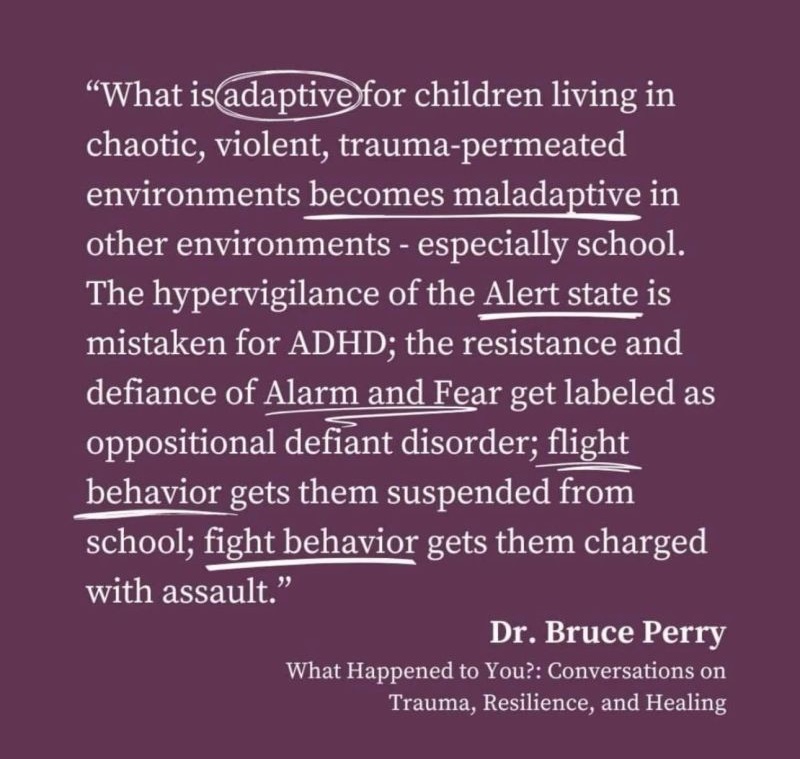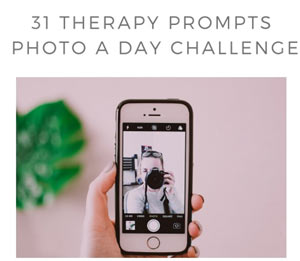
This post is a resource for trauma therapists to explore the relationship between trauma and ‘ADHD’ (Attention Deficit Hyperactivity Disorder). Taking a holistic approach, it also provides resources for other possible underlying causes for ADHD-like behaviours and symptoms. Hopefully this list of books, articles and videos will add an alternative view to the dominant medical and diagnostic model.
Research on Adverse Childhood Experiences (ACEs), attachment, interpersonal, developmental, and complex trauma reveal significant connections between trauma and ADHD-like behaviours and symptoms. Understanding the potential developmental roots of ADHD sheds light on the impact of trauma on neurodevelopmental and cognitive functioning.
Social constructs and environmental factors, including sleep patterns, screen time, nature deficit, diet, and more, also contribute to attentional challenges, highlighting the need for thorough exploration. It is imperative that individuals are assessed for trauma and other potential causes, rather than assessments solely from a medical model perspective, which has lead to a mass medicalisation of childhood and over-identification with certain parts of who we are, such as the mind and the brain.
It’s important to note here that Australian sociologist, Judy Singer, who coined the term ‘neurodiversity’ in her honours thesis, wrote, “I just thought this is incredible diversity. With our stupid education systems, we’re trying to lock people into this narrow channel, instead of exploring what diversity can bring us.” She never intended the term to be used to describe a particular condition, or for one to become identified with it, rather, she meant for it to be used in a more general sense, to describe a variety of all brains such as with the term ‘biodiversity’,
“You cannot have neurodiverse as an adjective to describe anything else except the whole world,” she says. She draws a parallel with “biodiversity”, which is not used for a particular type of plant or animal but the overall variety of every living creature. “It’s the property of the whole biosphere.”
Jo Watson, author of Drop the Disorder, calls on counsellors and psychotherapists to challenge diagnostic norms and overidentification with diagnostic labels that are increasingly pervading counselling and psychotherapy spaces. She urges professionals to resist colluding with psychiatric paradigms that may limit individuals’ self-understanding and self-identity.
As therapists, we have the opportunity to empower clients to explore the multifaceted aspects of all of who they are – body, feelings, mind & soul (self). As a non medical model, holistic field, we must remember to foster environments where individuals have the opportunity to explore the nature of their suffering, are seen beyond their diagnoses, promote holistic well-being and celebrate the richness of all human experiences.
Here is a list of resources such as books, podcasts, videos, and articles to assist the exploration of the intersection of trauma and ADHD.

Articles
Blue Knot Foundation. (n.d.). How Can Childhood Trauma Affect Behaviour.
Brown, N. M., Brown, S. N., Briggs, R. D., Germán, M., Belamarich, P. F., & Oyeku, S. O. (2017). Associations Between Adverse Childhood Experiences and ADHD Diagnosis and Severity. Academic Pediatrics, 17(4), 349-355.
Cathcart, S. (2018). Growing Evidence for the Link Between ADHD Diagnosis and Age at School Admission. Mad in America.
Chalmer, Lou. (2025) What Actually Causes ADHD?
Crouch, E., & Boswell, E. (2024). Adverse Childhood Experiences and Attention Deficit-Hyperactivity Disorder Diagnosis and Severity: An Update. Academic Paediatrics
Currie, J., Stabile, M., & Jones, L. (2014). Do Stimulant Medications Improve Educational and Behavioral Outcomes for Children with ADHD? Journal of Health Economics.
Friedman, R. (2014). A Natural Fix for ADHD. The New York Times.
Fuller-Thomson, E., & Lewis, D. A. (2015). The Relationship Between Early Aversities and Attention-Deficit/Hyperactivity Disorder. Child Abuse & Neglect, 47, 94-101.
Gau, S. S., & Chiang, H. L. (2009). Sleep Problems and Disorders among Adolescents with Persistent and Subthreshold Attention-Deficit/Hyperactivity Disorders. Journal of Sleep Research.
Grizenko, N., Fortier, M.-E., Zadorozny, C., Thakur, G., Schmitz, N., Duval, R., & Joober, R. (2012). Maternal Stress during Pregnancy, ADHD Symptomatology in Children and Genotype: Gene-Environment Interaction. Journal of the Canadian Academy of Child and Adolescent Psychiatry, 21(1), 9–15.
Honkasilta, J., & Koutsoklenis, A. (2022). ADHD in the DSM-5-TR: What Has Changed and What Has Not. Front Psychology.
Honkasilta, J., & Koutsoklenis, A. (2022). The (Un)real Existence of ADHD—Criteria, Functions, and Forms of the Diagnostic Entity. Front Psychiatry.
Hoza, B., Smith, A. L., Shoulberg, E. K., Linnea, K. S., Dorsch, T. E., Blazo, J. A., & McCabe, G. P. (2014). A Randomized Trial Examining the Effects of Aerobic Physical Activity on Attention-Deficit/Hyperactivity Disorder Symptoms in Young Children. Journal of Abnormal Child Psychology.
Jacobvitz, D., Hazen, N., Curran, M., & Hitchens, K. (2004). Observations of Early Triadic Family Interactions: Boundary Disturbances in the Family Predict Symptoms of Depression, Anxiety, and Attention-Deficit/Hyperactivity Disorder in Middle Childhood. Developmental Psychopathology, 16(3). PubMed.
Jimenez, M. E., Wade Jr, R., Schwartz-Soicher, O., Lin, Y., & Reichman, N. E. (2017). Adverse Childhood Experiences and ADHD Diagnosis at Age 9 Years in a National Urban Sample. Academic Medicine, 17(4), 356-361.
Leitch, D. E. (2012). Nature Deficit Disorder and the Effects on ADHD. A Seminar Paper Presented to The Graduate Faculty University of Wisconsin-Platteville.
Liu, H., Chen, X., Huang, M., Yu, X., Gan, Y., Wang, J., Chen, Q., Nie, Z., & Ge, H. (2023). Screen Time and Childhood Attention Deficit Hyperactivity Disorder: A Meta-Analysis. Review of Environmental Health.
Louv, R. (2005). Nature Deficit Is ADHD Research Overlooking the Green Factor? Health and the Environment.
Mad in America. (n.d.). Stimulants: ADHD and other behavioral disorders.
Maisel, E. (2022). Deconstructing ADHD: Mental Disorder or Social Construct? Ethics International Press; New edition.
McLaughlin, K. A., Sheridan, M. A., & Lambert, H. K. (2014). Childhood Adversity and Neural Development: Deprivation and Threat as Distinct Dimensions of Early Experience. Neuroscience & Biobehavioral Reviews, 47, 578-591.
Ríos-Hernández, A., Alda, J. A., Farran-Codina, A., Ferreira-García, E., & Izquierdo-Pulido, M. (2017). The Mediterranean Diet and ADHD in Children and Adolescents. Pediatrics, 139(2), e20162027.
Rubin, J. (2014). ADHD and Psychiatric Name Calling. From Insults to Respect.
Rubin, J. (2014). ADHD and the Wisdom of William James. From Insults to Respect.
Simons, P. (2023). ‘ADHD’ is a description of behaviour. But it’s falsely presented as a disease – here’s how. Mad in the UK.
Singh, I. (2014). Why Are We Failing Young Patients with ADHD? BMJ.
Singh, I. (2024). The Faulty Reason that Made ADHD a Disease. Mad in America.
Singh, I. (2024). The Faulty Reasoning that Made ADHD a Disease. Mad in Denmark.
Szász, A. (2022). Is it ADHD or nervous system dysregulation? Body & Soul.
Timimi, S. (2005). Naughty Boys: Anti-Social Behaviour, ADHD and the Role of Culture. Palgrave Macmillan.
Timimi, S. (2018). The Scientism of Attention Deficit Hyperactivity Disorder (ADHD). Mad in America.
Veness, R. (2024). Understanding ADD/ADHD – an Holistic Approach to Healing.
Walker, C. S., Walker, B. H., Brown, D. C., Buttross, S., & Sarver, D. E. (2021). Defining the Role of Exposure to ACEs in ADHD: Examination In a National Sample of US Children. Child Abuse & Neglect, 112,
Wiginton, K. (2022). Adult ADHD and Trauma, Is There A Link? WebMD.
Facebook Group
Drop the Disorder. (n.d.). [Facebook group].
Podcasts
Mad In America. (2020). ADHD is Over – Episode 18 [Audio podcast episode].
Videos
Armstrong, T. (2023). The Myth of the ADHD Child: 12 Part Video Series [YouTube playlist].
The Diary Of A CEO. (n.d.). Gabor Mate: The Childhood Lie That’s Ruining All Of Our Lives. | E193 [YouTube video].
The Diary of A CEO. Erica Komisar: Child Attachment Expert: We’re Stressing Newborns & It’s Causing ADHD! Hidden Dangers Of Daycare!
Rowsthorn, P. (2022). ADHD is BS [YouTube video].
Books
Armstrong, T. (2017). The Myth of the ADHD Child, Revised Edition: 101 Ways to Improve Your Child’s Behavior and Attention Span Without Drugs, Labels, or Coercion (1st ed.). Tarcher.
Hahn, Patrick. (2022). Obedience Pills: ADHD and the Medicalization of Childhood [Paperback]. Samizdat Health Writer’s Co-operative Inc.
Haidt, J. (2024). The anxious generation: How the great rewiring of childhood is causing an epidemic of mental illness. Penguin Press.
Hari, J. (2022). Stolen Focus: Why You Can’t Pay Attention [Paperback]. Bloomsbury.
Maisel, E. (Ed.). (2022). Deconstructing ADHD: Mental disorder or social construct? Ethics Press
Maté, Gabor. (2019). Scattered Minds: The Origins and Healing of Attention Deficit Disorder [Paperback]. Vermillion-Mass Market.
Perry, B. Winfrey, O. (2022) What Happened to You?: Conversations on Trauma, Resilience, and Healing [Paperback] Bluebird.
Timimi, S. (2021). Insane Medicine: How the Mental Health Industry Creates Damaging Treatment Traps and How you can Escape Them [Paperback]. Independently published.
Watson, J. (2019). Drop the Disorder!: Challenging the Culture of Psychiatric Diagnosis [Kindle Edition]. PCCS Books.




4 Responses
This book is a foundational text on challanging ADHD as a diagnosis and looks at the cultural factors around behaviours that get children, perticularly boys, labelled with ADHD https://www.amazon.co.uk/Naughty-Boys-Anti-Social-Behaviour-Culture/dp/140394511X/ref=sr_1_2?dchild=1&keywords=sami+timimi&qid=1603119280&s=books&sr=1-2
Thanks John, have added it to the list!
This is a good read on the subject: https://ethicspress.com/products/deconstructing-adhd
Thank you!